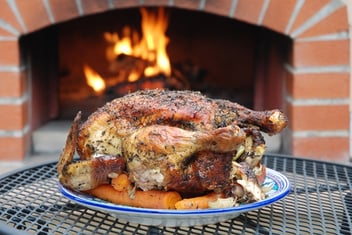The Fall of Fine Dining
Is fine dining really dead, with iconic restaurants closing their doors one after the other? Find out in this blog.
Rockpool Est 1989.jpeg
Servers in formal uniforms, fancy cutlery, and a calm atmosphere complete with elegant chandeliers, candlelit tables, and the aroma of an expensive wine. All these restaurant features are slowly becoming a thing of the past now as more and more people begin to move away from traditional fine dining.
Gone are the days when the ticket to luxury and great pleasure was a lunch reservation at a Michelin-starred restaurant or a full course dinner at a 5-star hotel. What customers prefer now is a fast, more casual dining experience that offers them great food, a unique dining experience and atmosphere, convenience and a different level of laid-back enjoyment.
Here in Australia, it has become evident that fine dining is on its way out, with iconic restaurants closing their doors one after the other. Among the most surprising was the famous Rockpool Est. 1989 in Sydney. The restaurant, which has earned 66 chef hats and was headed by Australian chef Neil Perry, made its departure in 2016 after operating for 27 years.
According to Perry, who is said to be “sick of fine dining”, closing down the business wasn’t an easy decision to make. “It has been a difficult decision, having dedicated the past 27 years to making Rockpool Est. 1989 one of Australia's best and most awarded restaurants. However, after much consideration and conversation, we have decided to move away from the traditional concept of fine dining that Rockpool Est 1989 has forged its reputation on.”
Perry opened a more casual dining venue in Sydney named Eleven
“We’re moving away from that traditional concept of fine dining but maintaining all the elements that are crucial to great dining; excellent
Sydney’s MoVida and Marque, both located in Surry Hills, have also ceased operations in the same year. Marque’s pioneering chef, Mark Best, said 17 years of running his
"I like the craft of restaurants and I like the art of it, and I like the customers. (Generally.) But when you've spent most of that time pushing against current trends, it's tiring. I've come to the point where I'm happy to move on. I'm 50 years old and I've got a lot left to achieve and I don't want to repeat myself. I can honestly say that looking back over 17 years at Marque, I've stuck to my guns,” Best explained.
Guillaume Brahimi’s signature Paddington fine diner Guillaume's also closed its doors for good at the end of 2016, while Melbourne lost its Moon Under Water restaurant headed by one of the city's most influential chefs, Andrew McConnell. These five famous establishments, though, aren’t the first ones to shut down operations. In 2013, Claude’s in Sydney closed after serving high end French cuisine for 37 years.
With all these saddening closures, it isn’t hard to assume that we’re starting to lose our appetite for fine dining, and the probable reason behind such is our growing interest in fast-casual dining.
CASUAL DINING BOOMS IN POPULARITY
Consumers in today's digital age are no longer impressed with formal environments and set menus. Sad but true.
As the industry develops, the needs and wants of people have also changed. They’re now looking for a more flexible and fun dining setting that offers them something new and unique. This is also what delicious editor-in-chief, Kerrie McCallum, noticed in the past few years.
“We have developed an appetite for eating more casually both out and at home, with share dishes and plates a popular way to eat rather than individual plates,” McCallum observes. “Even our dinner party/entertaining at home habits are moving in this direction — rather than slaving over a stove to serve up individual plates at a dinner party, people understand that getting together to eat should be celebrated and enjoyed (and not stressful)”.
McCallum also thinks that our changing lifestyles were among the factors that affected our new preferences in dining.
“We are even more casual dressers now — look at the rise of athleisure and the death of the formal
She has a point. Apparently, it seems like it is also our busy lifestyles and searches for convenience that paved the way for unique innovations like mobile food trucks and third-party delivery services. In city streets lately, you see lots of riders for Deliveroo, UberEats, and
Echoing McCallum’s thoughts is Fairfax Good Food Guides Editor, Myffy Rigby.
According to her, people are gravitating toward something new. "People are bored all the time. We're a country that's looking to be constantly distracted. With social media culture, we're always looking for the next thing, for something that's going to stimulate us. People want to have fun while eating fine dining. They want fun dining and fine dining.”
"People are smarter than ever before, more informed and want real experiences, and I don't necessarily think the prescriptive type of fine dining that we have been seeing for the past two decades is what people are expecting anymore. They might not want to sit in a still room with stiff linen tablecloths and five types of cutlery anymore,” Rigby added.
Meanwhile, executive chef Richard Duff from the smokehouse and bar NOLA at Barangaroo, Sydney believes that it was our lack of time and budget for expensive menus that led the fine dining market to vanish over the past several years.
“People just don’t have that sort of time to spend in a restaurant anymore, particularly younger people and that really is the future of the market,” Duff said. “We’re all time-poor and also there are fewer people that have $300 to spend on 13 courses. We’re not seeing that wayward corporate spending that we saw a few years ago.”
Duff even suggested that cooking shows, home barbecuing, and meat smoking will spark the next major dining trend in Sydney.
And he might be true.
Right now, barbecue-based meat restaurants are beginning to boom not just in Sydney but in other parts of the country. We have LP’s Quality Meats in the up and coming neighborhood of Chippendale and the CBD basement restaurant and bar Meatmaiden in Melbourne.
Of course, casual restaurant settings that introduce fresh concepts and offer genuine experiences are also on the rise. New restaurant Kisumé in Melbourne has been successful in attracting a large crowd with its mouth-watering Japanese dishes that come with a unique Australian sensibility. Sneaky Possum’s “hybrid” look and feel is also becoming a hit in Chippendale. It’s part cafe, part restaurant, part bar, and
All this being said, there’s no doubt that casual dining will be growing further and won’t be going away anytime soon. As a matter of fact, the fast-casual sector, which combines casual dining and fast food, has reported great numbers in the recent years, not just locally but also globally.
The value of the restaurant sector reached almost $47 billion in 2016 and has increased to $52 billion this year - a whopping 10% increase. It is the leading industry sector for growth!
In Australia, Euromonitor revealed that the year on year growth of
TOP CHEFS STILL POSITIVE ABOUT FINE DINING IN AUSTRALIA
Despite the back-to-back restaurant closures last year, the industry’s leading chefs believe that fine dining still has a place. Just because a number of high profile venues have closed, doesn't mean there is no demand at all. Rather, the industry is evolving - the trend in dining culture are shifting, just like it does in fashion.
“There's a lack of fine dining, but it's not dead,” Melbourne chef Peter Gunn affirmed. He also said that the closures of Rockpool, Marque, and Movida don’t worry him at all. “Chefs want
Marque’s chef Mark Best feels the same way. According to him, he still feels optimistic about the state of dining here in Australia. “The idea that me closing Marque is somehow evidence of the death of fine dining is something I reject completely. I'm sure the same tired tropes will be rolled out with this announcement, but this is a personal business and it's a personal decision," Best asserted with regards to the closure of his Surry Hills restaurant.
Just like Best, chef Guillaume Brahimi remains positive, too.
“This is definitely not the end of fine dining in this country,” he says. “I have restaurants at all levels across the country, from bistros to pubs and also a fine diner in Paddington in Sydney, and I can tell you there is a place for all of them and people want to have the option of different levels of experiences.”
“Yes, it is expensive and difficult to run a fine
Now, how about you? Do you think fine dining in Australia is really on its way out, or the dining trends are just shifting a bit to cater to new preferences? Share your thoughts in the comments section below.
In the meantime, if you’d like to read more industry insights from us, just head on over to our blog.

Avlya Jacob is a content writer at Ordermentum. When not working, she enjoys writing online novels and spending time with her husband.







